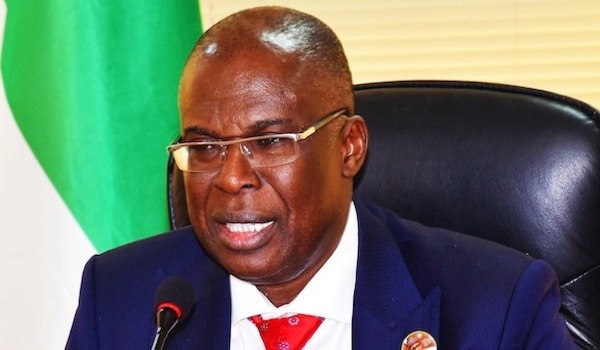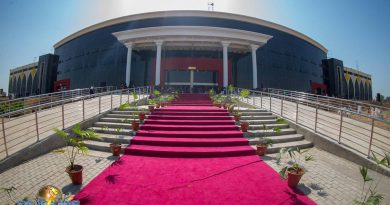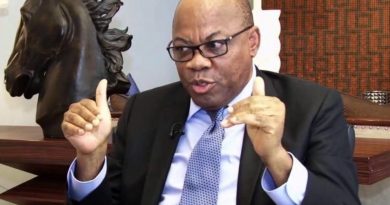Nigeria’s Minister of Petroleum Resources (State) disputes daily petrol consumption figures, ‘crazy, opaque’
Nigeria’s Minister of State for Petroleum Resources, Mr Timipre Sylva, on Tuesday, expressed doubts over Nigeria’s daily petrol consumption figures, describing the number as crazy and opaque.
The minister who appeared on a public tv broadcast station, the Nigerian Television Authority said in apparent frustration, that there’s nothing that needed to be interrogated that had not been questioned on the subsidy matter.
Sylva noted that the daily consumption figures released by concerned authorities were questionable, stressing that the best solution to the issue would have been to completely remove the subsidy.
Speaking on the dynamics of rising consumption figures and increasing subsidy payment, Sylva explained that although there was something fishy about the data, there’s nothing that hadn’t been done in the past to muscle those bleeding the country without success.
“I know when people say the figures are… I mean, we agree that the figures are all opaque. We agree. That’s why we are saying look, let’s stop all the shenanigans. Let’s stop all this discussion.
“And sometimes, the figures you hear are crazy. I mean, when they tell you 90 million litres a day, I mean, they’re crazy figures. So I mean, so for me what is the sum total of all this? We’ve been interrogating these numbers for 20 years.
“We continue to interrogate these figures because we all know that there is a problem here, it’s opaque. The opportunity, the premium is not coming to the government and it is not going to the poor people. It is going to a select people who are feeding fat on these things.
“So why don’t we just get rid of this thing? Okay, we should interrogate this thing, but I mean, to me that is not the solution. Why don’t we get just get rid of this whole subsidy so that we know that this problem is over once and for all?
“There have been efforts at controlling some of the smugglings. And then something dramatic happened. When we had the deregulation discussions, and the price moved up to N162 from N145 where I met it, we realised that the consumption dropped to less than 50 million litres or to 40 million.
“So, later on, once the exchange rate also now moved up a little bit and swallowed the gains we made from the N162 move, the figures increased again.
The minister while reacting to the insistence by a co-guest, Prof. Yinka Omorogbe, an energy law expert and President Nigerian Association of Energy Economists (NAEE), that Nigeria must investigate how many litres it consumes, among others.
The minister maintained that even labour that is against the removal of the subsidy knows the issues, adding that Nigeria continues to haemorrhage because the subsidy regime persists.
“Why don’t we just get out of it? Okay, there has been some corruption. So we can always deal with the corruption issues. We can always deal with all the opaque issues. But should we allow Nigerians who are not benefiting from this thing as you agree with me, to continue to be haemorrhaging?
“Let’s leave all this opaqueness, all this corruption in the subsidy, let us move away from subsidy and go on higher ground. And then they say no, no, no. There’s been a trial of subsidy thieves. Oh, we’ve gone on television to say okay, these are the template, these are the components of the templates,” he stated.
“Because we need to get out of this, because look at it, N3 trillion budget. You can imagine if this N3 trillion were to be budgeted for something else. Who’s going to benefit from it? I’m not into the downstream, I’m not going to benefit,” he stated.
He noted that even the Dangote refinery would not survive in a subsidised environment, the reason the businessman carefully planned it as an export facility around the Export Free Zone (EFZ) in Lagos.
“It is by his port because he was not refining to sell at a loss as the other refineries were designed to do. He designed it to sell at a profit internationally. If we are to buy from him, we will also buy at the international market. The only saving we will make as a government, in that case, is the cost of freight,” he argued.
“So, you find that that it was his own model, it is still not going to function under a subsidy regime, even Dangote refinery will not function. So, it is agreed that no refinery in the world can survive in a subsidy regime,” Sylva added.
Omorogbe had in her comments aligned with the views of Sylva, “I’m just in pains to know how we can implement the petroleum industry act. But I think a lot of the problem is that Nigerians have never really interrogated what this subsidy is, if it’s there to cushion us against the different price effects of importing petroleum products.
“What are the components of what is being paid for a subsidy? When you look at landing costs, what are the components of that landing cost? How much of it is the demurrage for example?
“Why are we paying for the incompetence of the system? If the government would get out of this area, I can see that many things would be wiped out, even though one is talking about temporarily having the price shoot up, it’ll come down.
“When there’s competition. No private person will pay for some of the things that are happening right now. That’s why I say I really don’t know where to start. But we should just sit down and interrogate that subsidy, subsidy price and see what we are paying for it and what’s in the landing costs.
“Let’s interrogate and say, how many litres do we use in Nigeria every day? Statistics in the downstream is incredibly opaque,” she argued.
Nigeria’s subsidy regime has for decades remained a subject of controversy, with the figures from the authorities ranging from between 50 million litres per day to around 103 million litres.
As at today, the Nigerian National Petroleum Company (NNPC) is the sole importer of the product, since private businessmen exited the scene due to the non-availability of foreign exchange years ago.
And having backtracked on its earlier plan to remove fuel subsidy as dictated by the Petroleum Industry Act (PIA), the executive arm of government is set to approach the National Assembly to approve the N3 trillion for the payment of subsidies in 2022. The government last week extended the implementation by 18 months.
The minister alleged that a few persons were holding the rest of the country to ransom, explaining that the rich rather than the most vulnerable in the country gain more from the payment of subsidies than the poor.




